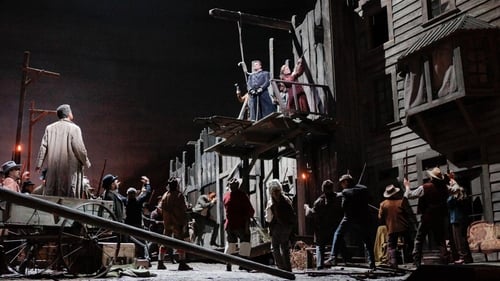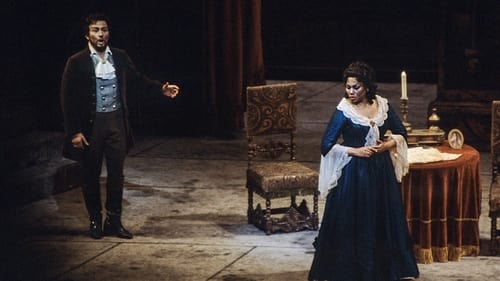
GORO
Cio-Cio-San, the young Japanese bride of American naval officer Lieutenant Pinkerton, finds her romantic idyll shattered when he deserts her shortly after their marriage. She lives in hope that one day he will return. Three years later, Cio-Cio-San and her son, Dolore, see Pinkerton’s ship in the harbour. She excitedly awaits his visit – but when Pinkerton and his American wife Kate arrive and learn about Dolore's existence, they ask to take the boy away, and raise him in America. Cio-Cio-San bids her son farewell and takes her own life.

Ruiz
집시 여인 아주체나는 어머니를 죽인 귀족에게 복수하려 그의 둘째 아들을 납치한다. 귀족의 첫째 아들 루나 백작은 장성해 아름다운 레오노라를 사랑하게 되지만, 레오노라는 만리코라는 이름의 음유시인과 마음을 나눈 사이이다. 분노한 루나 백작은 만리코를 체포하여 죽이려 하지만, 이들의 사랑과 욕망, 과거와 운명이 뒤엉킨 삼각관계는 결국 파국을 향해 치닫는다.

Spoletta

Guillot de Morfontaine
순진한 시골 처녀에서 화려한 코티잔(상류사회 남성들에게 향락을 제공하는 여성)으로, 그리고 추방당하는 죄수로 삶이 급변하는 마농의 스토리는 문학과 오페라 분야에서 가장 인상적인 비극의 하나다. 소프라노 리제트 오로페사가 거부할 수 없는 매력을 지닌 마농 역을 노래한다. 삶에서 섬세하고 아름다운 것들을 추구하다 파멸하는 비극적인 미인의 초상을 로랑 펠리는 대담한 연출로 그려냈다. 테너 마이클 파비아노는 열정에서 벗어나지 못하는 백작의 아들 데 그리외 역을 맡았다. 마농을 향한 그의 절절한 사랑은 결국 그들 두 사람을 파멸로 이끈다. 마우리치오 베니니가 마스네의 이 관능적인 음악을 지휘했다.

Emperor Altoum
중국 베이징의 전설 시대, 극은 북경 성벽 앞 광장에서 한 관리가 등장해 율령을 반포하며 시작한다. 투란도트 공주와 혼인하려면 수수께끼를 풀어야하고, 실패하면 참수된다는 내용의 이 울령으로 말미암아 많은 남자들이 수수께끼에 도전하게 되는데...

Maestro Trabuco
사랑에 빠진 후작의 딸 레오노라와 애인 알바로는 달아나던 중 알바로의 실수로 후작을 죽인다. 이 사건으로 두 사람은 헤어지고, 레오노라는 수도원에 들어가고 알바로는 군대에 자원한다. 오빠 돈 카를로도 이름을 바꾸고 스페인 군대에 들어가는데 그곳에서 전투 중 알바로와 친구가 된다. 그러나 알바로가 가지고 있던 레오노라의 초상화를 발견하고는 그의 정체에 분노한다. 돈 카를로는 복수를 위해 다시 그들을 찾아 헤맨 끝에 알바로를 발견하고 레오노라가 있는 수도원 근처에서 결투를 하게 된다. 결투 중 칼에 찔린 돈 카를로는 비명 소리를 듣고 달려오던 레오노라를 찌르고 함께 죽는다. 남겨진 알바로는 자신의 운명을 저주한다.

Nick
더 폴카(The Polka)라는 간판이 붙어 있는 살롱(saloon)에서 작은 금광을 하나 소유한 애시비(Ashby)가 무법자 래머레즈(Ramerrez)를 저쪽 골짜기에서 보았다고 얘기한다. 광부들과 술주정꾼들은 그 말에 별로 신경을 쓰지 않는다. 주점의 한쪽 벽에는 래머레즈의 현상 포스터가 붙어 있다. 이때 처음 보는 수상한 사람이 주점으로 들어오게 되는데...

Un "Incredibile"

Goro
Cio-Cio-San, the young Japanese bride of dashing American officer Lieutenant Pinkerton, finds her romantic idyll shattered when he deserts her shortly after their marriage. She lives in hope that one day he will return. Three years later, Cio-Cio-San and her little son see Pinkerton’s ship in the harbour. She excitedly expects his visit – but Pinkerton and his American wife Kate have come only to take the boy away, to raise him in America. Cio-Cio-San bids her son farewell and then takes her own life.

Goro

The Incredible
“Kaufmann is performing the title role for the first time, and it’s hard to imagine him bettered. His striking looks make him very much the Romantic and romanticised outsider of Giordano’s vision. His voice, with its dark, liquid tone, soars through the music with refined ease and intensity: all those grand declarations of passion, whether political or erotic, hit home with terrific immediacy.” – The Guardian Presented in its Covent Garden premiere in January 2015, this staging – directed by David McVicar and conducted by the Royal Opera’s Music Director, Sir Antonio Pappano – shows a bloody tricolour daubed with the words “Even Plato banned poets from his Republic” – written by Robespierre on the death warrant of the historical Chénier, a poet and journalist sent to the guillotine in 1794 for criticising France’s post-revolutionary government.

Altoum
Visually this is a gripping production which captures the drama of this opera perfectly. It's downright exciting! and I found the singing, acting, and orchestral playing reasonably fine. I found only one major problem with it, a problem that kept Puccini for quite a few years. Turandot has been looking for an opportunity to kill Calif and Calif has singlemindedly tried to get Turandot to love and wed him focusing on her and ignoring a better looking girl who loves him truly. The problem is how to get the audience to applaud the match once Calif gets his wish. Puccini couldn't figure out how to do it. The traditional quick ending doesn't do it, and Berio's attempt is longer , tries its best, but ends up making it plain this is one wierd couple.

Dr Caius
Music Director James Levine conducts his first new Met production after a two-year absence: Robert Carsen’s hit staging of Verdi’s great human comedy. Ambrogio Maestri is an ideal Falstaff, leading an extraordinary ensemble cast of veteran and up-and-coming Met stars, including Angela Meade (Alice), Stephanie Blythe (Mistress Quickly), Franco Vasallo (Ford), and Jennifer Johnson Cano (Meg). Lisette Oropesa and Paolo Fanale are the young lovers, Nannetta and Fenton.

Emperor Altoum
The Arena di Verona Festival honors Italian stage director Franco Zeffirelli, and his legendary production of Turandot. Interpreted within the sumptuous surroundings of Verona Arena, this Puccini's masterpiece tells the story of a princess whose beauty was only comparable to her cruelty. She will only marry a prince capable of solving her riddles, but if he fails, he will be beheaded... For this edition, the lyrical festival invites the russian soprano Maria Guleghina who proved a brilliant Turandot. She took to the stage with Salvatore Licitra's trump card is his imposingly radiant tenor voice of wich he remains in sovereign control, and the soprano Tamar Iveri is a beautiful and sensitive Liù.

Poisson
In the present stylised production by Lorenzo Mariani the 'violet-perfumed murderess' is taken by mezzo-soprano Marianne Cornetti, one of the most in-demand representatives of her vocal category. Opposite her, in the role of Adriana, is a soprano who as a Verdi and verismo specialist also appears regularly at all the major international opera houses, Micaela Carosi. The 'cock-of-the-walk' role is sung by the world-class tenor Marcelo Álvarez. His timbre, velvety smooth yet robustly virile, is ideally suited to a vocal characterisation of the idolised Maurizio. Conductor Renato Palumbo is very much at home with Cilea's operatic masterpiece, since the Italian Romantic and verismo periods are at the core of his extensive repertoire.

Mastro Trabuco

Ruggero Raimondi and Barbara Frittoli star in this 2006 production of the Verdi opera with Zubin Mehta conducting the Maggio Musicale Fiorentino. Giuseppe Verdi's last opera is given new life in this production by Luca Ronconi. Utilizing the sights and social conditions of modern Britain, this version of Shakespeare's THE MERRY WIVES OF WINDSOR keeps the comedy accessible while still featuring all the elements that have made this opera a perennial favorite.

Flavio
In Guy Joosten's ingenious production of Bellini's masterpiece, Norma is about more than just beautiful singing. It becomes a layered, timeless drama in which Norma is the archetypal successful woman struggling to retain her dominant but vulnerable position. Hasmik Papian's lyrical and intense interpretation of the title role accentuates the striking similarity between a Druid high priestess and a modern opera diva. Conductor Julian Reynolds guides the brilliant cast, choir and Netherlands Chamber Orchestra to great heights, providing a refreshing new take on the chef d’oeuvre of bel canto.

Goro, a matchmaker
Japan, early twentieth century. U.S. Navy Lieutenant B.F. Pinkerton inspects the house he has leased from a marriage broker. The broker, Goro, has procured him three servants and a geisha wife, Cio-Cio-San, known as Madama Butterfly. He is enchanted with the fragile Cio-Cio-San. Cio-Cio-San is heard in the distance joyously singing of her wedding. In a quiet moment, Cio-Cio-San shows her bridegroom her few earthly treasures and tells him of her intention to embrace his Christian faith. The Imperial Commissioner performs the wedding ceremony, and the guests toast the couple. The celebration is interrupted by Cio-Cio-San's uncle, a Buddhist priest, who bursts in, cursing the girl for having renounced her ancestors' religion. Alone with Cio-Cio-San in the moonlit garden, her husband dries her tears, and she joins him in singing of their love.

Jeppo Liverotto














